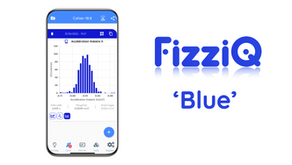top of page
Our blog
Interesting articles published regularly on education and science teaching, the use of FizziQ, or scientific articles.


Your Smartphone is a Science Lab: 50 Physics Measures you can do with your mobile
Can you imagine that your smartphone can do more than 50 different types of measurements on sound, movement, light, color, energy? All of...

Christophe Chazot
Mar 1, 202311 min read


5 science projects in biomechanics with a smartphone
Do you know that biomechanics allows athletes to boost their performance by applying the laws of mechanics to living beings? In this...

Christophe Chazot
Feb 23, 20237 min read


The 18 sensors in your smartphone
Did you know that your smartphone can contain up to 18 different types of sensors? In this article we review them and explain what they can be used for! Table of content The different categories of sensors What is MEMS technology? The accelerometer - The gyroscope - The orientation sensor - The pedometer The thermometer - The barometer - The humidity sensor The Magnetometer - The GPS - The Lidar The photoelectric cell - The CMOS sensor - The heart rate sensor T

Christophe Chazot
Feb 23, 202313 min read


Five math experiments to do with your smartphone
In this article, we propose five activities in the field of mathematics to be carried out with your smartphone. They can be offered to...

Christophe Chazot
Feb 20, 20235 min read


Seven experiments to measure the speed of sound in the air
Calculating the speed of sound becomes a simple and engaging task with the use of a smartphone, transforming this commonly abstract concept into a tangible learning experience. For students, this exercise is particularly gratifying as it demystifies the complexities of sound waves, allowing them to explore its various physical properties through a device that's a familiar staple in their everyday lives. In this article, we introduce seven experiments, each utilizing a smartph

Christophe Chazot
Feb 2, 20238 min read


Six science experiments with the tone generator
Tone generators, also called frequency generators or synthesizers, can be used to conduct many exciting scientific experiments to understand sound waves . In this article we describe 6 science projects that use the tone generator and which can be adapted to your specific needs. Table of content What is a tone generator ? - Create an acoustic beat - Generate an anti-sound - Synthesize the timbre of a oboe - Perform an audiogram - Protect yourself from too loud sounds

Christophe Chazot
Nov 28, 20229 min read


Could we see a sound?
You can see the swell, a mechanical wave that propagates on the surface of the water; you can also see an earthquake; but can we see a sound wave? And what if it were possible? We will see that this seemingly simple question opens up exciting educational scenarios for using the inquiry method with students. 1. Can we see a sound ? Experience shows that we cannot see a sound: whether the music is loud or not, whether a note is high or low, the visual appearance of the world a

Christophe Chazot
Nov 24, 20227 min read


Our 7 tips for making a good video for motion analysis
Making and analyzing a motion analysis (or kinematic) video with your students is a great way to engage them. To avoid wasting too much...

Christophe Chazot
Nov 11, 20223 min read


Vidéo analysis of pole vault jumping
The movement of athletes is one of the most interesting subjects of kinematic study. The precision of gestures, the transformation of energies, the complexity of trajectories are all exciting subjects to study for the student, in a field that is generally familiar to him. In this post, we analyze the most complex discipline of athletics: pole jumping. This movement is interesting because it makes it possible to study the multiple transformations of energy: kinetic energy of t

Christophe Chazot
Nov 9, 20224 min read


What's new with FizziQ 'Blue'?
What are the latest innovations embedded in FizziQ 'Blue' ?

Christophe Chazot
Nov 1, 20222 min read


Fun and serious Low Frequency Oscillators effects (LFO)
In this blog, we will study the acoustic phenomenon of rhythmic pulses. This effect is very easy to create with the FizziQ application...

Christophe Chazot
Jul 6, 20225 min read


Why is green light used in watches to measure heartbeat ?
Many applications allow you to calculate the heart rate using only the camera of a smartphone. On what principles are these applications...

Christophe Chazot
Dec 17, 20216 min read


Science experiments with a smartphone for high school curriculum (ISCED3, K12 9th-12th)
Smartphones are the ideal tool to conduct rapid experimentation on a variety of science topics. We have gathered here 10 experiments that...

Christophe Chazot
Nov 15, 20212 min read


Does adding two sounds really increase the sound level by 3 decibels?
It is not easy to demonstrate in class that the addition of two sound sources of the same intensity leads to an increase in the sound...

Christophe Chazot
Oct 2, 20212 min read


Brightness or luminance?
You have probably noticed that there are several different types of light measurements in FizziQ: luminance and brightness. What is the...

Christophe Chazot
Apr 22, 20212 min read


How to create and share experimental protocols?
FizziQ is an open system that helps teachers create their own experimental protocols, either from existing protocols that they can...

Christophe Chazot
Apr 22, 20214 min read


Our tips to use FizziQ in the classroom
The use of smartphones or tablets in the classroom requires a framework but also some flexibility.Following our experiments in class,...

Christophe Chazot
Apr 22, 20212 min read


What is the difference between linear and absolute acceleration?
Quand on ouvre le menu accéléromètre dans FizziQ on trouve deux types d'accélération : l'accélération linéaire et l'accélération absolue.

Christophe Chazot
Apr 22, 20213 min read


Smartphones for inquiry based science education
Imagine a digital tool that helps students master scientific experimentation, not virtually, but by observing the world around them....

Christophe Chazot
Apr 22, 20212 min read
bottom of page